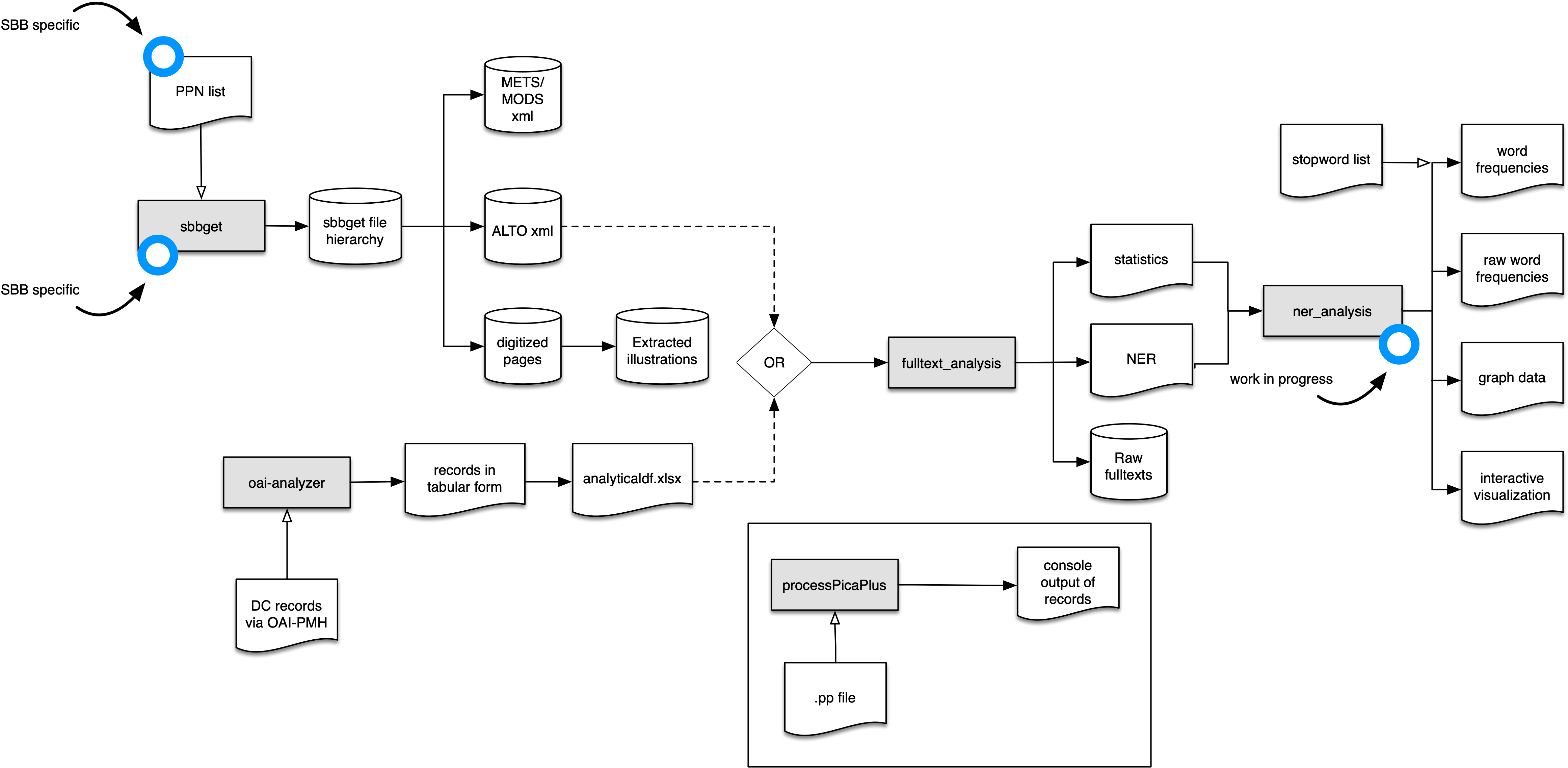Various utilities to deal with metadata and content provided by the Berlin State Library/Staatsbibliothek zu Berlin
The scripts work together as illustrated below:
- a Python script that is capable of downloading digitized media, the associated metadata, and its fulltext from Berlin State Library's digitized collections.
- it also extracts images that have been detected by the OCR and stores them in the desired file format, e.g., JPEG
- the extracted illustrations can also be stored as .tar files to facilitate distribution
- its logic is based on the more or less unique PPN identifier used at the Berlin State Library.
- some PPN lists are shipped for demonstration purposes. more can be obtained at the Berlin State Library or the creator of the script.
- the script will create various folders below its current working directory, e.g.,
- downloads (fulltexts, original digitizations etc.) are stored at: sbbget_downloads/download_temp/
- extracted images are stored at: sbbget_downloads/extracted_images/
- METS/MODS files are stored at: sbbget_downloads/download_temp//__metsmods/
- the script comes pre-configured and tries to download an existing book from the Berlin State Library if run directly (no parameters needed)
- the script has been tested with Python 3.9 and 3.11 but should run with other versions as well
- the script can be configured by modifying the accompanying YAML configuration file
- the script comes with some sample collection that are described here
- a Python script that downloads METS/MODS files and DC metadata via OAI-PMH and analyzes them, e.g., to save ALTO XML URLs for certain records or to save metadata such as language codes or authorships
- the results of the analyses are saved locally for further processing in various formats, e.g. Excel and CSV
- a Python script that retrieves all fulltexts from a SBBget created download directory and converts all files to raw text files
- additionally, the script runs a NER on all created raw text files and saves the results, the NER is based on flair
- for best (i.e. fast) results you should use a GPU but the script will also run on the CPU
- alternatively the script can operate on the result file created by OAI-Analyzer and download ALTO files directly, from this perspective it serves as a Stabi fulltext corpus builder
- the script is based on NLTK which needs additional installation steps, i.e.:
- install NLTK in your Python environment
- when running the script, Python will ask you to install additional NLTK packages, the easiest way is to open a Python interpreter and run to launch NLTK's graphical installer or to download the needed data via:
import nltk nltk.download('punkt')- usually, NLTK will inform you about missing data if you forgot this step
- further information can be found an online book that also gives an introduction into natural language processing
- the script comes pre-configured and can be launched after SBBget has run (no additional parameters are needed, the script looks for the SBBget download folder at the standard location)
- the script has been tested with Python 3.9 and 3.11 but should run with other versions as well
- ner_analysis is based on the results from fulltext_analysis and creates graph data etc.
- this script is still under development
-
a Python script that parses files in the Pica+ format as provided by the GBV
-
the script lets you choose interesting fields (as stored in the fieldsOfInterest list) and will output the contained data
-
records will be separated by a NEW_RECORD string on command line or by an empty line in the text format
-
output can be saved in text format, separated by the language of the record
-
standard fields are:
- title
- author (+ optional GND ID)
- country of publication (only the first entry in a specific extension of the DIN ISO 3166 format)
- publisher and place of publication
-
documentation of the Pica Plus format is only available in German here:
